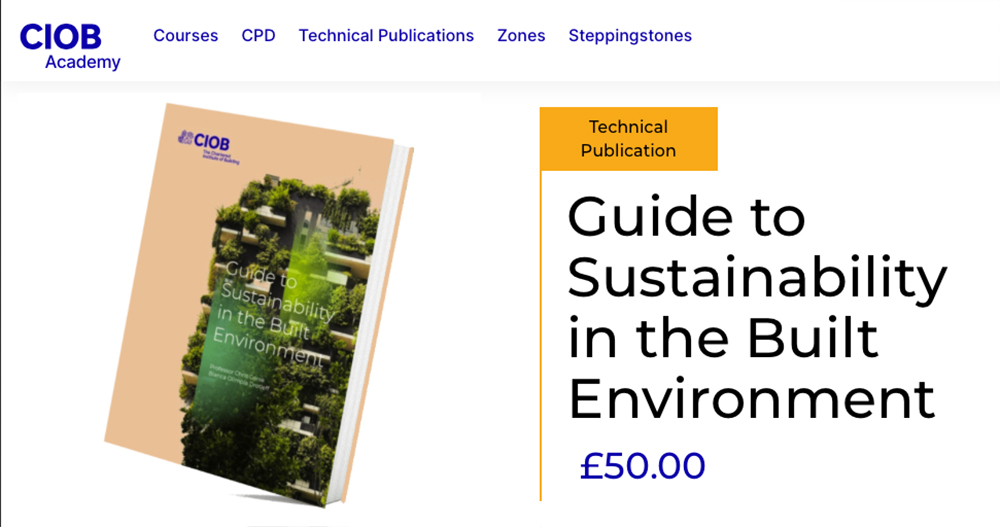Guide to sustainability in the built environment
Contents |
[edit] The Chartered Institute of Building (CIOB) has launched a new sustainability guide for built environment professionals.
The guide covers topics including sustainability development goals, green financing, embodied and operational carbon, biodiversity and social value. It offers practical tools and strategies to help readers embrace sustainable practices during the planning, construction and ongoing operation of a building to support national and global efforts to reach net zero, while also improving the environment for surrounding communities.
Dr Gina Al-Talal, FCIOB, head of technical technical and standards development at CIOB, said: “Sustainability guides are now fairly common but ours is specifically tailored to the construction profession so will be an extremely valuable resource for our members and the wider sector. It provides a reference point at every stage of a construction project and emphasises the importance of integrating sustainable practices and the difference this can make to the environment and local communities.”
Amanda Williams, Head of Environmental Sustainability at CIOB, said: “The construction industry has a vital role to play in responding to the twin challenge of climate change and biodiversity loss. We must harness all the skill and ingenuity of the sector, as we aim to ensure that the projects we deliver today make a positive contribution to the kind of future we want to see. This comprehensive guide to sustainability in the built environment is essential reading for construction professionals as they work to make their difference to this defining challenge and put sustainability at the heart of everything they do.”
Dr Michael Yam, FCIOB, CIOB’s 2022/23 President, said: “The construction and built environment sector needs to reset as the 2050 net zero target approaches. This means a movement towards more intensive use of modern methods of construction, more off-site work, more innovative use of materials, more infrastructure directly supporting zero-carbon energy production, and more re-fitting than knocking buildings down. At the CIOB, our goal is to help steer the sector through turbulent waters, keeping an eye on our destination of a safe, carbon neutral, high-quality built environment. A built environment that contributes to the achievement of the Sustainable Development Goals. It is our hope that this sustainability guide will serve as a roadmap to get us to that destination.”
The new publication - ‘A guide to Sustainability in the Built Environment’, is available on the CIOB’s website https://ciob.me/sustainabilityGuide priced at £50 (£40 for CIOB members).
[edit] Guide to Sustainability in the Built Environment published by CIOB
This Guide to Sustainability in the Built Environment provides a comprehensive reference for stakeholders in the buildings and construction sector, introducing sustainability principles, offering tools for addressing climate, nature, and social challenges at organisational and project levels, and outlines the benefits of adhering to relevant standards and environmental certifications. Only available electronically. CIOB members receive 20% discount.
[edit] Summary
Although sustainability is steadily growing in importance for businesses, governments and other societal actors, it remains a developing agenda with change closely following recognised science. This guide offers practices based on best available knowledge at this time and should act as a reference point for professions associated with the buildings and construction sector, including clients, contractors, construction managers, designers, facility managers, building owners, tenant groups and others looking for integrated pathways to sustainability.
[edit] Contents
- The challenge ahead of us
- Sustainability and the Sustainability Development Goals
- The Global Transition to Sustainability
- Corporate Sustainability
- Managing Risk
- Sustainable and Green Finance
- Sustainable and Operational Assessment
- Sustainability Standards: Introduction and Global Review
- Sustainability Standards and Asset Value
- Life Cycle Analysis of Embodied and Operational Carbon and Energy
- Biodiversity Conservation and Construction
- Social Sustainability and Social Value
[edit] About the Author
Chris Gorse (MICOB) is Professor of Construction Engineering and Management at the University of Loughborough and Chair of the CIOB Sustainability Panel and Policy Forum. Leading major research projects for government and industry, with a focus on the built environment, quality and energy efficiency.
Bianca Drotleff (GradIEMA) is a project manager and works with organisations who look at new sustainability approaches and tools, circular economy, zero carbon and resilient business models
This article was published on the CIOB news and blog site as "Guide to Sustainability in the Built Environment", dated October 4, 2023 and appears on the CIOB Academy site under the same name.
--CIOB
[edit] Related articles on Designing Buildings
- Biotechnology: The key to zero energy buildings.
- Circular Construction in Regenerative Cities (CIRCuIT).
- Circular economy.
- Climate change science.
- CRC Energy Efficiency Scheme.
- Earth overshoot day.
- Ecological impact assessment.
- Economic sustainability.
- Emission rates.
- Energy Act.
- Energy Performance Certificates.
- Energy Related Products Regulations.
- Energy targets.
- Environmental impact assessment.
- Environmental legislation.
- Environmental plan.
- Global Real Estate Sustainability Benchmark GRESB.
- Green building.
- Intergovernmental Panel on Climate Change.
- Low carbon.
- Mean lean green.
- Passivhaus.
- Reduce, reuse, recycle.
- Regenerative design.
- Scotland publishes plans to reach net zero targets with Heat in Buildings Strategy.
- Site waste management plan.
- The sustainability of construction works
- Sustainable development.
- Sustainable materials.
- Sustainable procurement.
- Sustainable urban drainage systems.
- Sustainability appraisal.
- Sustainability aspirations.
- Sustainability in building design and construction.
- Sustainability in facility management.
- The Carbon Plan: Delivering our low carbon future.
- Upcycling.
- UK Climate Change Risk Assessment.
- Zero carbon homes.
- Zero carbon non-domestic buildings.
Featured articles and news
A case study and a warning to would-be developers
Creating four dwellings... after half a century of doing this job, why, oh why, is it so difficult?
Reform of the fire engineering profession
Fire Engineers Advisory Panel: Authoritative Statement, reactions and next steps.
Restoration and renewal of the Palace of Westminster
A complex project of cultural significance from full decant to EMI, opportunities and a potential a way forward.
Apprenticeships and the responsibility we share
Perspectives from the CIOB President as National Apprentice Week comes to a close.
The first line of defence against rain, wind and snow.
Building Safety recap January, 2026
What we missed at the end of last year, and at the start of this...
National Apprenticeship Week 2026, 9-15 Feb
Shining a light on the positive impacts for businesses, their apprentices and the wider economy alike.
Applications and benefits of acoustic flooring
From commercial to retail.
From solid to sprung and ribbed to raised.
Strengthening industry collaboration in Hong Kong
Hong Kong Institute of Construction and The Chartered Institute of Building sign Memorandum of Understanding.
A detailed description from the experts at Cornish Lime.
IHBC planning for growth with corporate plan development
Grow with the Institute by volunteering and CP25 consultation.
Connecting ambition and action for designers and specifiers.
Electrical skills gap deepens as apprenticeship starts fall despite surging demand says ECA.
Built environment bodies deepen joint action on EDI
B.E.Inclusive initiative agree next phase of joint equity, diversity and inclusion (EDI) action plan.
Recognising culture as key to sustainable economic growth
Creative UK Provocation paper: Culture as Growth Infrastructure.


























